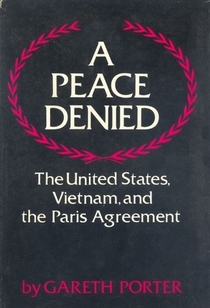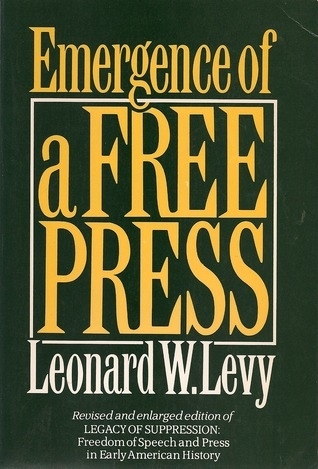
Noam Chomsky Books - 100 Recommended Picks
Noam Chomsky
There is a famous Noam Chomsky book list consisting of top 100 books Noam Chomsky ever recommended and mentioned. It is the full Noam Chomsky book list.
Noam Chomsky is a highly-regarded linguistics professor, one of the most prominent minds to live in our time.
Not only he is active in terms of his academic influence, but he is also a political activist who never stops before telling the truth.
Noam Chomsky is a genuine intellectual. He revolutionized linguistics with his non-empiricist language theory, and after that, he continued expressing his talents in the field of social and political studies.
He is an extremely well-read person, so Noam Chomsky book recommendations are valuable for those who seek to enrich their library with books on serious and timeless topics.
He is also known for his sharp ideas on society, politics, and his deeply philosophic approach to any books and discussions.
Justice and truth are the main concepts that guide Noam Chomsky. You will notice it in the Noam Chomsky book list: the pieces show various opinions on the same topic.
He is not afraid to defend the truth. Noam Chomsky has spoken a lot throughout his life defending justice and uncovering fraud or corruption schemes.
Professor Chomsky is a man that stands behind his ideas no matter what political powers are dominant at that time.
Noam Chomsky book recommendations are perfect for those looking to deeply dive into the political, linguistic, or sociological matters and observe the subject from multiple standpoints.
Noam Chomsky book list is a thoroughly curated selection of books that encourage and develop critical thinking.
So, take a glimpse to the library of Noam Chomsky - an unparalleled author and scientist.
See all
0
likes
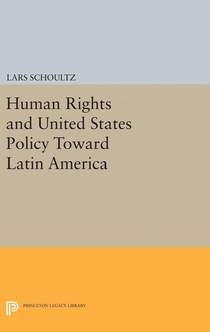
Human Rights and United States Policy Toward Latin America
The role of human rights in United States policy toward Latin America is the subject of this study. It covers the early sixties to 1980, a period when humanitarian values came to play an important role in determining United States foreign policy. The author is concerned both with explaining why these values came to impinge on government decision making and how internal bureaucratic processes affected the specific content of United States policy.Originally published in 1981.The Princeton Legacy Library uses the latest print-on-demand technology to again make available previously out-of-print books from the distinguished backlist of Princeton University Press. These editions preserve the original texts of these important books while presenting them in durable paperback and hardcover editions. The goal of the Princeton Legacy Library is to vastly increase access to the rich scholarly heritage found in the thousands of books published by Princeton University Press since its founding in 1905.
See all
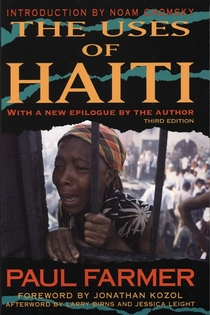
The Uses of Haiti
The Uses of Haiti tells the truth about uncomfortable matters--uncomfortable, that is, for the structures of power and the doctrinal framework that protects them from scrutiny. It tells the truth about what has been happening in Haiti, and the US role in its bitter fate.--Noam Chomsky, from the introduction In this third edition of the classic The Uses of Haiti, Paul Farmer looks at what has happened to the health of the poor in Haiti since the coup. Winner of a McArthur Genius Award, Paul Farmer is a physician and anthropologist who has worked for 25 years in Haiti, where he serves as medical director of a hospital serving the rural poor. He is the subject of the Tracy Kidder biography, Mountains Beyond Mountains.
See all
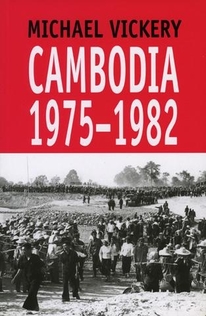
Cambodia, 1975-1982
Cambodia 1975-1982 presents a unique and carefully researched analysis of the Democratic Kampuchea regime of Pol Pot and the Khmer Rouge (1975-79) and the early years of the People's Republic of Kampuchea (1979-89). When it was first published in 1984, the book provided one of the few balanced and reasoned voices in a world shocked by media reports of incredible brutality. Now, 15 years later, the book remains unsurpassed as an original historical document bringing a new interpretation based on the earliest primary sources - interviews with the Khmer people themselves. "The most comprehensive and definitive political history to date of the Pol Pot regime in Cambodia. . . . Overall a balanced, judicious account." -Choice
See all

Ruthless Criticism
Ruthless Criticism was first published in 1993. Minnesota Archive Editions uses digital technology to make long-unavailable books once again accessible, and are published unaltered from the original University of Minnesota Press editions. Ruthless Criticism offers perspectives and subjects largely outside traditional historiography. It broadens the concept of media history to include lesser-studied media, and offers alternative interpretations of traditional media. This anthology of original research includes an array of scholarly and theoretical perspectives. Each addresses specific topic within a specific era. reflecting the diversity of U.S. mass media. Solomon and McChesney begin by using critical theory and deconstruction to examine the meanings of print in the colonial era. Subsequent chapters study the media ecology of the antebellum press; the intense focus on profits of the post-Civil War mainstream press; gender images in the labor press; the diversity of political views within the working-class press; and the development of a commercial press in the black community. The essays concerning the twentieth century focus on the rise of a culture industry and include studies on the origins of the broadcast ratings system and the commercial broadcast system and the commercial broadcast system, early television's portrayals of childhood, the televisions networks' close ties with the federal government, the government's key role in creating and developing the field of mass communication research, and teenage girls' popular culture from 1960–1968 as a formative influence on the feminist movement.
See all
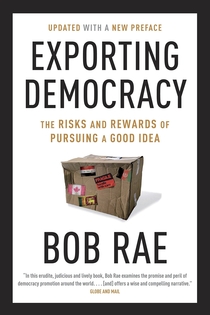
Exporting Democracy
The idea that the United States can and should help Latin America achieve democracy has been a recurrent theme in U.S. foreign policy throughout the twentieth century. By the 1990s, it had become virtually unchallenged doctrine, broadly supported on a bipartisan basis. Yet no systematic and comparative study of U.S. attempts to promote Latin American democracy has ever been published — and the policy community often seems unaware of this history.In Exporting Democracy, Abraham F. Lowenthal and fourteen other noted scholars from the United States, Latin America, and Europe explore the motives, methods, and results of U.S. efforts to nurture Latin American democracy. Contributors focus on four periods when such efforts were most intense: the years from World War I to the Great Depression, the period immediately following World War II, the 1960s, and the Reagan years. The book tells a cautionary tale — revealing that U.S. efforts to export democracy in the Americas have met with little enduring success and often have had counterproductive effects.Exporting Democracy is available in two paperback volumes, each introduced by Abraham Lowenthal and organized for convenient course use. In the first paperback volume, Themes and Issues, contributors and their topics are Paul W. Drake, From Good Men to Good Neighbors: 1912-1932; Leslie Bethell, From the Second World War to the Cold War: 1944-1954; Tony Smith, the Alliance for Progress: The 1960s; Thomas Carothers:,The Reagan Years: The 1980s; Elizabeth A. Cobbs, U.S. Business: Self-Interest and Neutrality; Paul G. Buchanan, The Impact of U.S. Labor; John Sheahan, Economic Forces and U.S. Policies; Laurence Whitehead, The Imposition of Democracy; Abraham F. Lowenthal, The United States and Latin American Democracy: Learning from History.In the second paperback volume, Case Studies, the contributors and their topics are: Carlos Escude, Argentina: The Costs of Contradiction; Heraldo Munoz, Chile: The Limits of "Success"; Jonathan Hartlyn, The Dominican Republic: The Legacy of Intermittent Engagement; Lorenzo Meyer, Mexico: The Exception and the Rule; Joseph Tulchin and Knut Walter, Nicaragua: The Limits of Intervention; Elizabeth A. Cobbs, U.S. Business: Self-Interest and Neutrality; Paul G. Buchanan, The Impact of U.S. Labor; John Sheahan, Economic Forces and U.S. Policies; Laurence Whitehead, The Imposition of Democracy; Abraham F. Lowenthal, The United States and Latin American Democracy: Learning from History.
See all
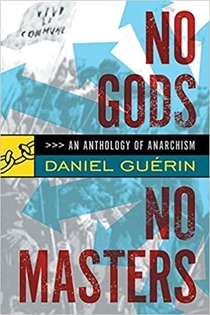
No Gods, No Masters
The second volume of Guerin's monumental anthology of anarchism. Book Two includes work from Malatesta, Henri, Pouget, Souchy, Leval, Voline, Makhno, the Kronstadt sailors, Fabri, Durruti and others. It covers such events as the Anarchist International, the General Strike, the Russian Revolution and the Spanish Civil War.
See all
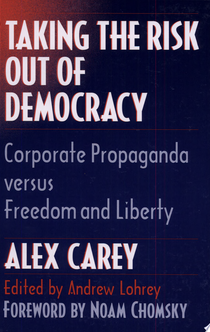
Taking the Risk Out of Democracy
This compelling book examines the twentieth-century history of corporate propaganda as practiced by U.S. businesses and its export to and adoption by other western democracies, chiefly the United Kingdom and Australia.A volume in the series The History of Communication, edited by Robert W. McChesney and John C. Nerone
See all
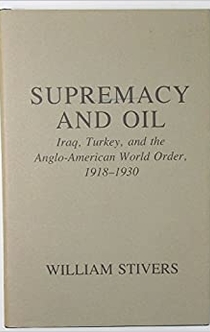
Supremacy and Oil: Iraq, Turkey and the Anglo American World Order 1918-1930: Stivers, William
Supremacy and Oil: Iraq, Turkey and the Anglo American World Order 1918-1930 [Stivers, William]

Anarcho-Syndicalism
In 1937, at the behest of Emma Goldman, Rocker penned this political and philosophical masterpiece as an introduction to the ideals fueling the Spanish social revolution and resistance to capitalism the world over. Within, Rocker offers an introduction to anarchist ideas, a history of the international workers' movement, and an outline of the syndicalist strategies and tactics embraced at the time (direct action, sabotage and the general strike). Includes a lengthy introduction by Nicholas Walter and a Preface by Noam Chomsky. "[Rocker's] approach is far from 'utopian'; this is not an abstract discourse but a call to action."--Noam Chomsky Rudolf Rocker (1873-1958) was a leading figure in the international anarchist movement for over 60 years.
See all
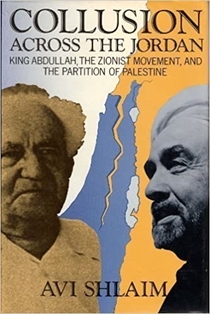
Collusion Across the Jordan
This book is an account of the highly secret relationship between Abdullah, the Hashemite ruler of Jordan, and the Zionist movement. Spanning three decades, from the appointment of Abdullah as Emir in 1921 to his assassination in 1951, this work focuses on the clandestine diplomacy and the political and military processes which determined the fate of Palestine between 1947 and 1950, and which left the Palestinian Arabs without a homeland.
See all

Business as a System of Power
Business as a System of Power was the direct product of extensive and continuing study of the rise of bureaucratic centralism. The project was begun in 1934, and resulted a decade later in this volume, arguably the most important work in comparative and historical economics to emerge in the World War Two period. Indeed, Brady's theorems such as the bureaucratic authoritarian model of development, became a touchstone for the study of Third World economies.Brady saw the direction of business moving in a variety of directions: from the totalitarian model set by fascism with its highly centralized approach to special interests, profit making and policy made in the interests of those who rule; and the alternative democratic model set by the democracies of the West, which expound the latitude of direct public participation in decision-making and social organization of the economy as a whole. Brady does not indulge in cheap conspiracy theory. Rather he sees the business classes worldwide as possessing a collective mind, but not a collective will. In this setting the business civilization itself is at stake.The volume offers a fascinating study of German Nazism, Italian fascism and Japanese militarism as a series of policies rather than historical inevitabilities. But the work is also a foreboding and a warning to democratic varieties of capitalism. As business becomes increasingly global in character, unbound by national interests or democratic aims, it also becomes more rational in its own terms. Its drive for maximizing profits with scant regard to what may be less cost effective, but more open to popular control or participation, becomes transparent. Brady provides a remarkably prescient, albeit controversial, study of trends in Western democracy and big business. Robert S. Lynd, in his Preface, writes, "Brady cuts through to the central problem disrupting our worldàa world-wide counter-revolution against democracy." More than a half century later, in his outstanding review of the life and career of Robert Brady, Douglas Dowd points to the same lessons: economic inequities, economic globalization and political concentration of power. "In such a world, the counsel of a Brady never loses its vitality."Robert A. Brady was professor of economics at Columbia University, and author of The Rationalization Movement in German Industry; The Spirit and Structure of German Fascism; and The Scientific Revolution in Industry. Douglas F. Dowd was professor of economics at Johns Hopkins University and author of a number of important books on economics, including Modern Economic Problems in Historic Perspective.
See all
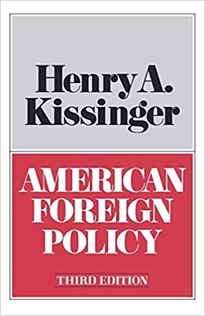
American Foreign Policy
The initial two essays, "Domestic Structure and Foreign Policy" and "Central Issues of American Foreign Policy," appeared in the original edition of this volume and have been retained as backdrops for fifteen major addresses delivered by Mr. Kissinger over the past four years. The new selections include a statement to Congress that traces the main lines of d�tente policy; a review of the step-by-step process of negotiations in the Middle East; an analysis of efforts to achieve accords, with the Soviet Union on strategic arms limitation without imperiling American national security; a speech to the United Nations on the imperative of establishing a balanced global approach to economic development and resource conservation; several papers that candidly appraise prospects for new ties between the United States and the nations of Asia, Africa, and Latin America; and one that sets forth measures to strengthen the bonds among the industrial democracies. In their scope and detail, these documents constitute a remarkable set of designs, blueprints, and working drawings by a master architect of foreign policy.
See all
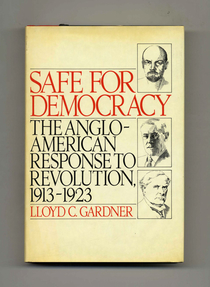
Safe for Democracy
"This groundbreaking book probes the ways in which two capitalist superpowers, Great Britain and the United States, reacted to the momentous challenge of revolution that emerged during the early years of this century. The revolutions that inflamed Mexico in 1910, China in 1911, and Russia in 1917 all occurred within the same period of upheaval that culminated in the Great War in Europe. Yet no previous study has treated these revolutions under one cover or assessed their collective impact on the Western democracies with such precision and insight." -- Book Jacket
See all
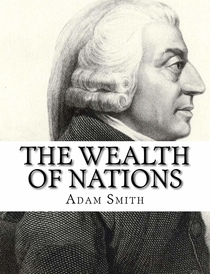
The Wealth Of Nations (Annotated)
Adam Smith's masterpiece, first published in 1776, is the foundation of modern economic thought and remains the single most important account of the rise of, and the principles behind, modern capitalism. Written in clear and incisive prose, The Wealth of Nations articulates the concepts indispensable to an understanding of contemporary society.
See all
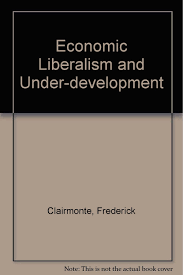
Economic Liberalism and Underdevelopment: Studies in the Disintegration of an Idea.
Economic Liberalism and Underdevelopment: Studies in the Disintegration of an Idea. By Frederick Clairmonte. New York: Asia Publishing House, 1960, vi, 344. Tables, Indices. $6.25. - Volume 21 Issue 3

Israel's Border Wars, 1949-1956
This book looks at the development of Israeli-Arab relations during the formative years 1949 to 1956, focusing on Arab infiltration into Israel and Israeli retaliation. Palestinian refugee raiding and cross-border attacks by Egyptian-controlled irregulars and commandos were a core phenomenon during this period and one of the chief causes of Israel's invasion of Sinai and the Gaza strip in 1956.Benny Morris probes the types of Arab infiltration and the attitude of Arab governments towards the phenomenon, and traces the evolution of Israel's defensive and offensive responses. He analyzes Israeli decision-making processes, including the emergence and ultimate failure of Foreign Minister Moshe Sharett's dissident policy of moderation, and describes in detail the history of the Arab infiltration, including the terrorist-guerrilla raids by state-organized Fedayeen in 1955-6, and of the IDF raids of Qibya, Nahhalin, Kinneret, and the Sabha.This was a precedent-setting period in the making of Israeli defense policy, and this pattern of raiding and counter-raiding served to define Israeli-Arab relations during the subsequent four decades. In this pioneering study Morris deepens our understanding of the current situation in the Middle East and of the prospects for a lasting peace there.
See all

Voices of a People's History of the United States
Here in their own words are Frederick Douglass, George Jackson, Chief Joseph, Martin Luther King Jr., Plough Jogger, Sacco and Vanzetti, Patti Smith, Bruce Springsteen, Mark Twain, and Malcolm X, to name just a few of the hundreds of voices that appear in Voices of a People's History of the United States, edited by Howard Zinn and Anthony Arnove.Paralleling the twenty-four chapters of Zinn's A People's History of the United States, Voices of a People’s History is the long-awaited companion volume to the national bestseller. For Voices, Zinn and Arnove have selected testimonies to living history—speeches, letters, poems, songs—left by the people who make history happen but who usually are left out of history books—women, workers, nonwhites. Zinn has written short introductions to the texts, which range in length from letters or poems of less than a page to entire speeches and essays that run several pages. Voices of a People’s History is a symphony of our nation’s original voices, rich in ideas and actions, the embodiment of the power of civil disobedience and dissent wherein lies our nation’s true spirit of defiance and resilience.
See all

Collateral Damage
Written during and after the Persian Gulf War, this anthology includes original research and in-depth analysis of U.S. foreign policy and its domestic repercussions. The contributors look at the war abroad and at home, addressing race, gender, geo-politics, ecology, economics, and the movement for peace and justice.
See all

The Iran-Contra Connection
This explosive book lays bare the personalities and institutional relations behind the headlines. It goes beyond the recent events to discern the roots of contemporary U.S. covert activity within the past two decades. The Iran-Contra Connection delves in to the details of CIA and extra-CIA operations, including drug-trafficking, gun-running, government-toppling, and assassination. The Iran-Contra scandal is not merely a plan gone awry, the authors argue, but a consistent outgrowth of a long tradition of U.S. covert activity- from the Bay of Pigs invasion teams to the NSC organizational team; from the CIA and the World Anti-Communist League to the Israeli connection and the State Department.
See all
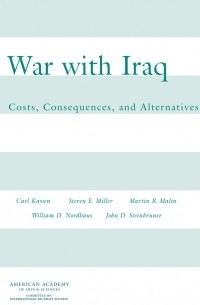
War with Iraq: Costs, Consequences, and Alternatives
War with Iraq: Costs, Consequences, and Alternatives [Carl Kaysen, Steven E. Miller, Martin B. Malin, William D. Nordhaus, John D. Steinbruner]

The Kennedy Tapes
For sheer drama, this work of history may never be duplicated. The events of the Cuban Missile Crisis unfold in the actual words of President John F. Kennedy and his top advisers. Now available in a new, concise edition, this book retains its gripping sense of history in the making. "[A] splendid achievement, as powerful and exciting a book as one is likely to read this year...."—Barry Gewen, New York Times Book Review "Gripping history."—Richard J. Tofel, Wall Street Journal "[M]esmerizing. I was utterly fascinated....the best, fullest account of crisis yet and will remain so for decades to come."—Stephen E. Ambrose "[A]s close as most people will ever get to being a fly on the wall during the discussions of leaders."—Los Angeles Times Sunday Book Review, James G. Blight
See all
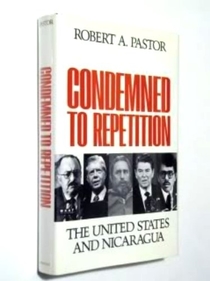
Condemned to Repetition
"Robert Pastor is uniquely qualified to write a definitive book of this kind about the relationship between Nicaragua and the United States . . . what it has been, is now, and what it ought to be. For anyone deeply interested in this crucial subject, Condemned to Repetition is an unequaled source of interesting facts and ideas."--Jimmy Carter"A significant and revealing work on an issue of continuing great strategic importance to the United States."--Zbigniew Brzezinski
See all

The Limits of State Action
This text is important both as one of the most interesting contributions to the liberalism of the German Enlightenment, and as the most significant source for the ideas which John Stuart Mill popularized in his essay On Liberty. Humboldt's concern is to define the criteria by which the permissible limits of the state's activities may be determined. His basic principle, like that of Mill, is that the only justification for government interference is the prevention of harm to others. He discusses in detail the role and limits of the state's responsibility for the welfare, security and morals of its citizens. Humboldt's special achievement in this work is to enlarge our sense of what a liberal political theory might be by his particularly sensitive grasp of the complexity of our attitudes to and our need of other people. Dr Burrow has based his translation on Coulthard's version of 1854. In an important introduction, he provides a most perceptive as well as scholarly guide to Humboldt's political thought.
See all

